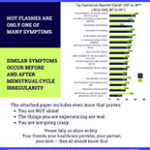- Late reproductive stage
- Menopausal transition
Why Does Herstasis Love This Paper?
Because it informs that critical question of ‘Are My Symptoms Normal’ and helps us understand that bothersome symptoms can start way before age 50.
This paper is the first one we have found that presents what types of symptoms are being experienced, how frequently, and how difficult the experiences are for women in the late reproductive stage and in the menopause transition.
- This study looked at the survey responses of 1529 diverse women to determine the occurrence, frequency, burden and interference of over 40 symptoms.
- The symptoms were categorized under:
- sleep disruption
- vasomotor symptoms and heart palpitations
- mood changes
- headache and sore breasts
- brain fog and dizziness
- painful sex and libido
- vaginal and urinary changes

Abstract
The aim of this study was to examine the occurrence of a variety of symptoms, their frequency, bother, burden, and interference in the lives of women in the late reproductive stage (LRS) and compare their experiences to that of women in the menopausal transition (MT) stage.
Women ages 35 to 55 years responded to an 82-question online survey offered by Women Living Better. Participants reported current menstrual patterns, recent changes and symptom frequency, bother, and interference. Women’s cycles were classified as LRS or MT using Stages of Reproductive Aging Workshop +10 criteria.
Of 2,406 respondents, 946 met criteria for LRS and 583 for MT. Participants included 30% from outside the United States, 31% from diverse racial/ethnic groups, and 18% reported having difficulty paying for basics. A similar proportion of women in the LRS and MT+ groups reported each of the symptoms: there was a less than 10% difference for 54 of the 61 symptoms. Of mean bother ratings for all symptoms, only hot flashes differed significantly between the LRS and MT groups. LRS women experienced similar levels of symptom-related interference with personal relationships and daily living to those in the MT stage but did not anticipate these symptoms occurring until they were 50 years old.
Women in the LRS experience symptoms strikingly similar to those often associated with the MT. Women do not expect these changes until the age of 50 years or later and are surprised by such symptoms before cycle irregularity. Research about the epidemiology and management of LRS symptoms, anticipatory guidance for women, and education for clinicians who care for them warrant increased attention.
Keywords
- Menopause symptoms
- Menstrual irregularity
- Ovarian aging
- Perimenopause symptoms
Citation
Coslov N, Richardson MK, Woods NF. Symptom experience during the late reproductive stage and the menopausal transition: observations from the Women Living Better survey. Menopause. 2021;28(9):1012-1025. Published 2021 Jul 26. doi:10.1097/GME.0000000000001805
Summary
- Details of women’s experiences with symptoms.
- Symptoms start much earlier than many women expect.
- The numbers of women experiencing different types of symptoms, and how challenging those symptoms are in their daily lives.
- Compares the types of symptoms women experience in the late reproductive stage versus the menopausal transition.
- Provides detailed information on the frequency, severity, burden and level of interference women are experiencing with these symptoms.
- Focuses on the age at which many women start to experience symptoms of menopause, showing that symptoms of menopause can start long before the formally defined menopausal transition stage.
- The lead author, Nina Coslov, is the co-founder of Women Living Better, a research organization with the mission to create awareness about the earliest part of the menopausal transition by sharing knowledge and information from their own research.
- Women Living Better is a credible research organization with a very reputable science advisory board made up of 10 leading women’s health researchers including Marcie Richardson MD (Director of the Menopause Consultation Service at Atrius Health and an Assistant Clinical Professor at Harvard Medical School), Nanette Santoro, MD, Chair, Department of Obstetrics and Gynecology and Professor, Division of Reproductive Endocrinology), and Jerilynn Prior, MD, FRCPC, Professor of Medicine – Endocrinology at the University of British Columbia and Scientific Director of the Centre of Menstrual Cycle and Ovulation Research.
- It has an Altmetric Attention score of 57, which is in the top 5% of research outputs scored by Altmetric. This score provides an indicator of the amount of attention that it has received
- It is published in the Menopause: The Journal of the North American Menopause Society.
Related Symptoms & Therapies
About The Author
The lead author, Nina Coslov, is the co-founder of Women Living Better, a research organization with the mission to create awareness about the earliest part of the menopausal transition by sharing knowledge and information from their own research.
About The Source
Women Living Better is a credible research organization with a very reputable science advisory board made up of 10 leading women’s health researchers including Marcie Richardson MD (Director of the Menopause Consultation Service at Atrius Health and an Assistant Clinical Professor at Harvard Medical School), Nanette Santoro, MD, Chair, Department of Obstetrics and Gynecology and Professor, Division of Reproductive Endocrinology), and Jerilynn Prior, MD, FRCPC, Professor of Medicine – Endocrinology at the University of British Columbia and Scientific Director of the Centre of Menstrual Cycle and Ovulation Research.

